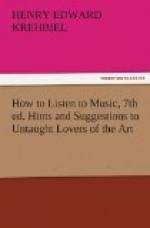Addison confesses that he was often afraid when seeing the Italian performers “chattering in the vehemence of action,” that they were calling the audience names and abusing them among themselves. I do not know how to measure the morals and manners of our Italian singers against those of Addison’s time, but I do know that many of the things which they say before our very faces for their own diversion are not complimentary to our intelligence. I hope I have a proper respect for Mr. Gilbert’s “bashful young potato,” but I do not think it right while we are sympathizing with the gentle passion of Siebel to have his representative bring an offering of flowers and, looking us full in the face, sing:
"Le patate d’amor,
O cari fior!"
[Sidenote: "Faust."]
[Sidenote: Porpora’s “Credo."]
It isn’t respectful, and it enables the cynics of to-day to say, with the poetasters and fiddlers of Addison’s day, that nothing is capable of being well set to music that is not nonsense. Operatic words were once merely stalking-horses for tunes, but that day is past. We used to smile at Brignoli’s “Ah si! ah si! ah si!” which did service for any text in high passages; but if a composer should, for the accommodation of his music, change the wording of the creed into “Credo, non credo, non credo in unum Deum,” as Porpora once did, we should all cry out for his excommunication.
As an art-form the opera has frequently been criticised as an absurdity, and it is doubtless owing to such a conviction that many people are equally indifferent to the language employed and the sentiments embodied in the words. Even so serious a writer as George Hogarth does not hesitate in his “Memoirs of the Opera” to defend this careless attitude.
[Sidenote: Are words unessential?]
“The words of an air are of small importance to the comprehension of the business of the piece,” he says; “they merely express a sentiment, a reflection, a feeling; it is quite enough if their general import is known, and this may most frequently be gathered from the situation, aided by the character and expression of the music.”
[Sidenote: "Il Trovatore."]
I, myself, have known an ardent lover of music who resolutely refused to look into a libretto because, being of a lively and imaginative temperament, she preferred to construct her own plots and put her own words in the mouths of the singers. Though a constant attendant on the opera, she never knew what “Il Trovatore” was about, which, perhaps, is not so surprising after all. Doubtless the play which she had fashioned in her own mind was more comprehensible than Verdi’s medley of burnt children and asthmatic dance rhythms. Madame de Stael went so far as to condemn the German composers because they “follow too closely the sense of the words,” whereas the Italians, “who are truly the musicians of nature, make the air and the words conform to each other only in a general way.”




